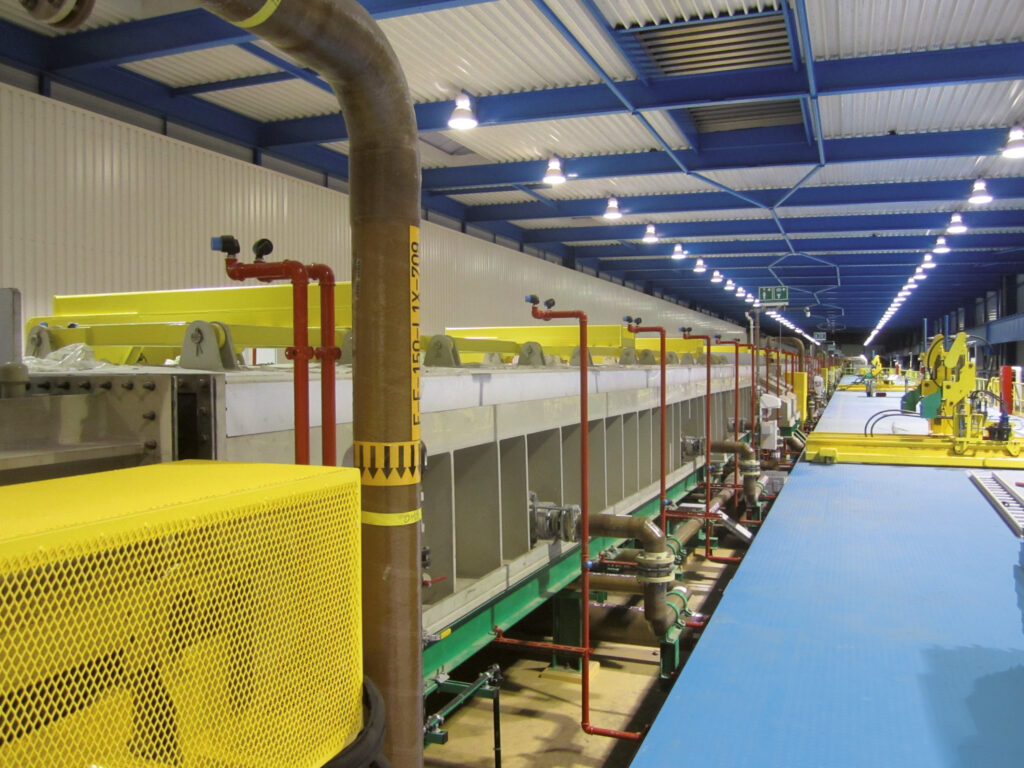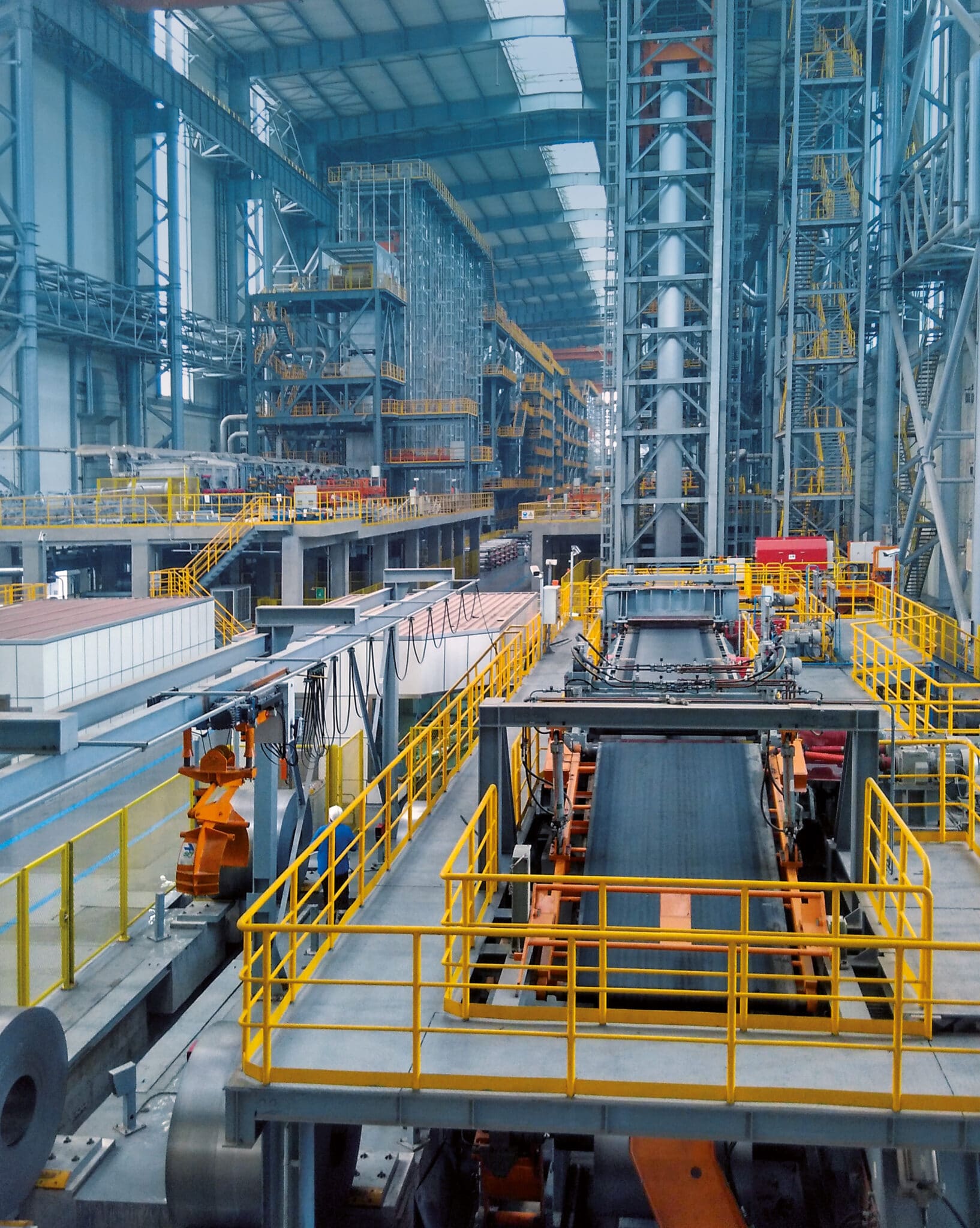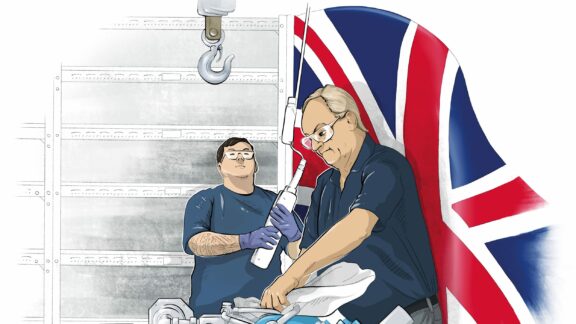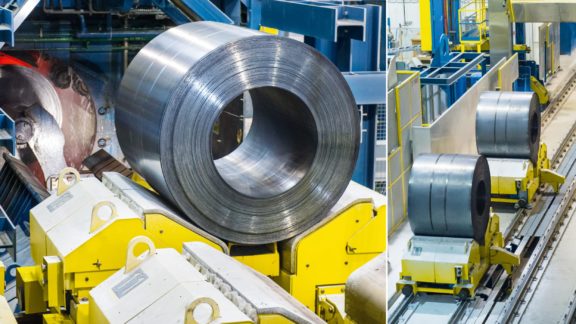This post is also available in: 简体中文 (Chinese (Simplified))
Primetals Technologies has an outstanding reputation for high-performance and cost-efficient strip-processing lines that support operators to fully meet market demands for high-end products as required by the automotive industry, the construction sector and for white goods. The company’s processing solutions include continuous or push-pull pickling lines, continuous galvanizing and other metallic coating lines, organic coating lines, continuous annealing lines, stainless steel lines, finishing lines as well as expert systems for quality monitoring. Additionally, customers profit from metallurgical expertise and know-how offered by Primetals Technologies to keep up with the latest production trends and market requirements.
Companies are increasingly calling for higher-quality products and production lines that require a lower energy consumption and reduced maintenance. To satisfy the market demands for top quality, plant operators need to produce strip with perfect surfaces, excellent flatness, tight dimensional tolerances, uniform mechanical properties and reliable coating adhesion properties.
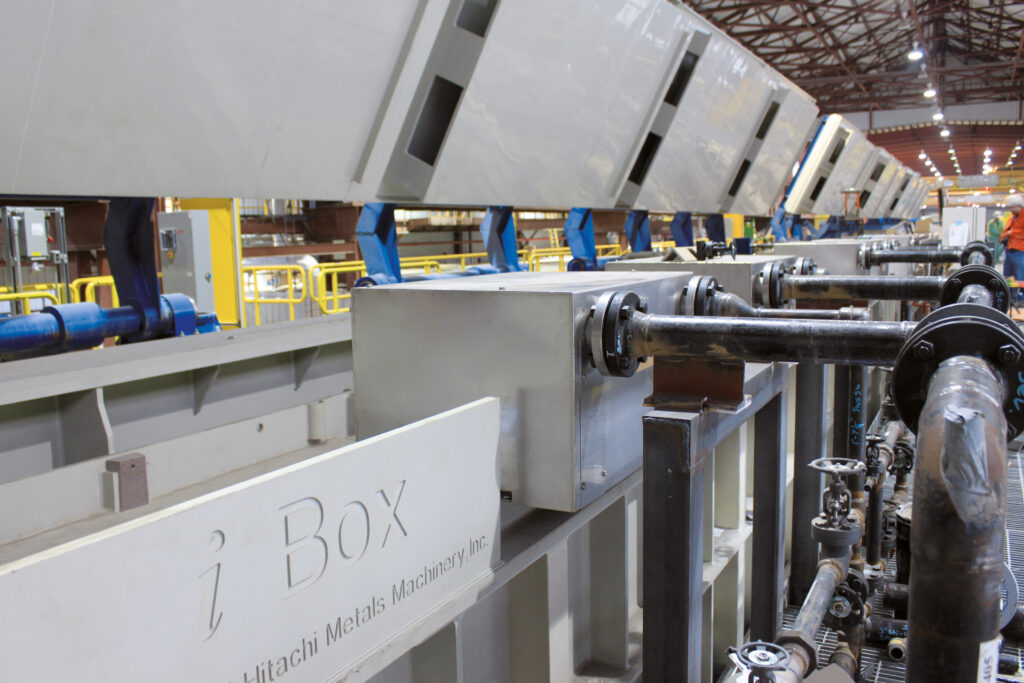
Primetals Technologies offers integrated and comprehensive solutions to meet the ever-increasing requirements placed on quality, productivity and cost efficiency. These solutions are the result of years of operational and design experience as well as the close collaboration with leading steel manufacturers worldwide. Furthermore, continued emphasis placed on research and development has led to the application of new solutions, such as the highly efficient iBox pickling process (Figure 1), compact and cost-optimized hot- and cold-strip galvanizing and annealing lines, air knives with an integrated strip stabilizer, light- and heavy-gauge laser welders, the galvannealing line section for automotive strip qualities and SIAS automatic surface-inspection systems (Figure 3). An overview of the solutions offered for strip-processing lines from Primetals Technologies is presented in the following:
Pickling lines
Continuous and push-pull pickling lines from Primetals Technologies feature modular design, high pickling efficiency, economical operation and the application of advanced technologies for high-speed pickling. Continuous pickling lines are supplied with compact scale breakers, advanced heavy laser welders, heavy side trimmers outfitted with a scrap chopper, and a flat-tank design. Pickling line speeds of up to 400 m/min are possible with the iBox tank system, which does not require a complex acid-recirculation system, or with the tunnel-tank type equipped with side jets. The pickling process section is automatically regulated by an acid concentration control system, which offers significant benefits in terms of productivity, quality, operation management and operational costs. The latest pickling line references and projects are shown in Table 1.
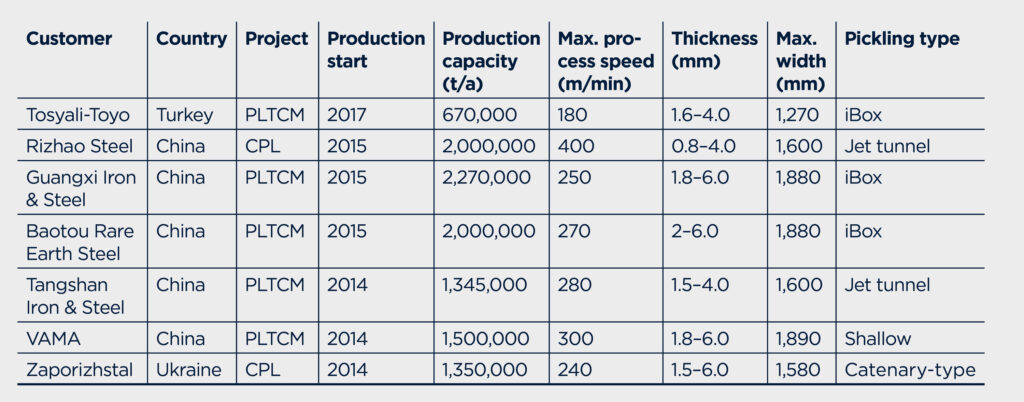
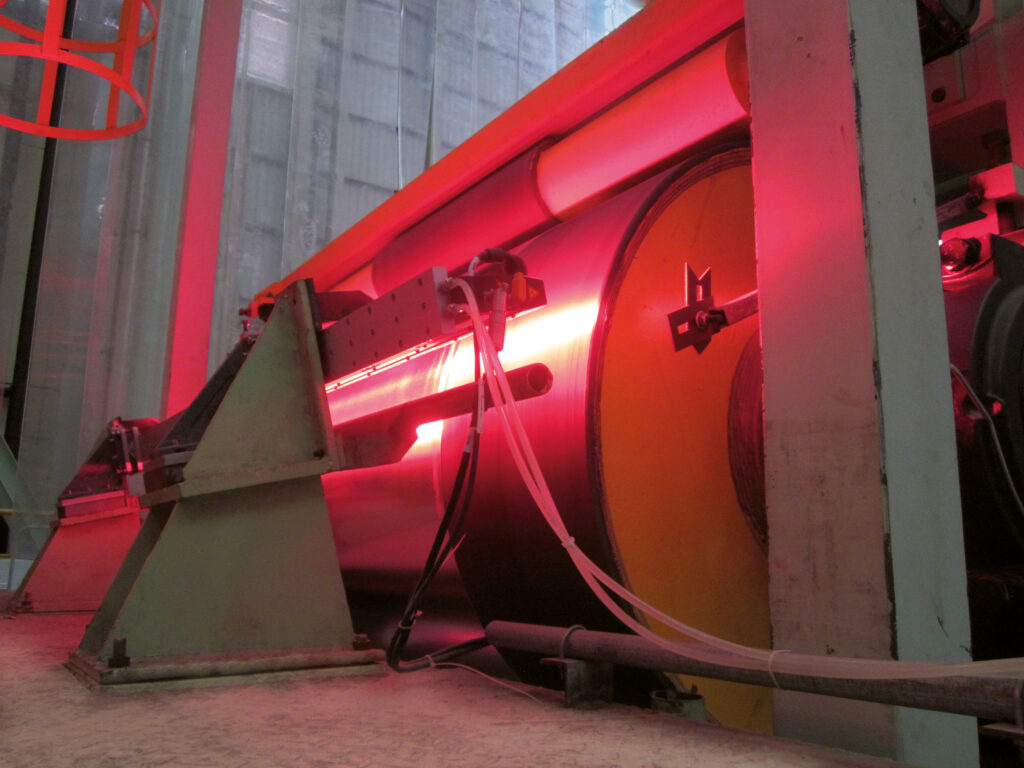
For the pickling of up to approximately 1 million tons of strip per year, push-pull pickling lines offer significant advantages with respect to investment costs and operational flexibility. This is particularly the case with frequently changing strip dimensions and steel grades. Primetals Technologies offers a uniquely designed V-shape flat pickling tank, which improves strip stability during its passage through the tank.
Annealing and galvanizing lines
Primetals Technologies supplies both batch-type and continuous annealing lines. The latter is highlighted by a flexible, multi-zone furnace design for the production of a broad range of steel grades and dimensions. Continuous annealing lines are available for both carbon steel and tinplate sheet applications. The lines integrate key technologies that include the furnace, mash-lap or laser welders, cleaning sections, air knives, temper mill and tension levelers, side trimmers with a scrap chopper, rotary shears, roll coaters, electrostatic oilers and SIAS automatic surface-inspection systems. Continuous lines are required for high throughput rates, high yields, significant energy savings and the production of high-quality products for high-end applications.
Customized solutions are offered for hot-dip galvanizing of both hot- and cold-rolled strip (Figure 4). The most stringent market demands are met for the production of first-class materials for automotive grades, exposed surfaces, white goods and construction applications. All types of coatings can be applied to meet the wide range of strip-protection needs. Examples include pure zinc, galvannealing (ZnFe), galfan (Zn95 Al), zinc aluminum (Al55Zn) and aluminum (AlSi or Al), to name just a few. Examples of the latest annealing and galvanizing line references and projects are listed in Table 2.
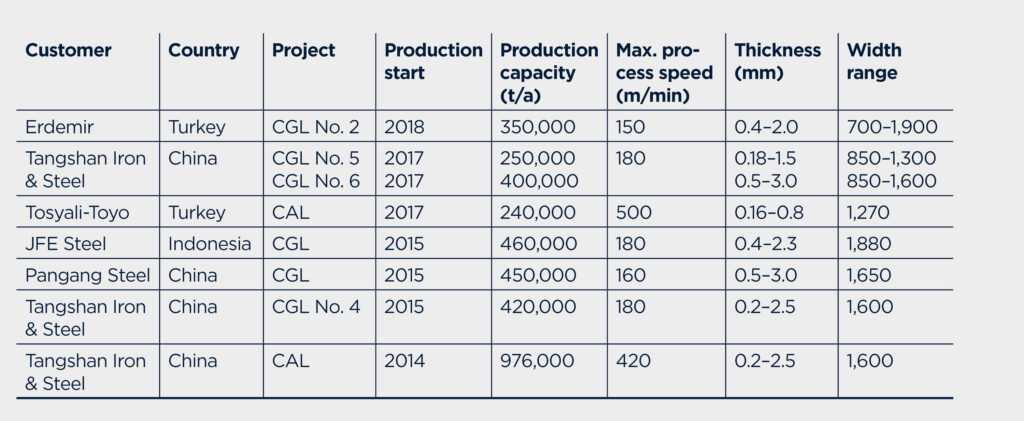
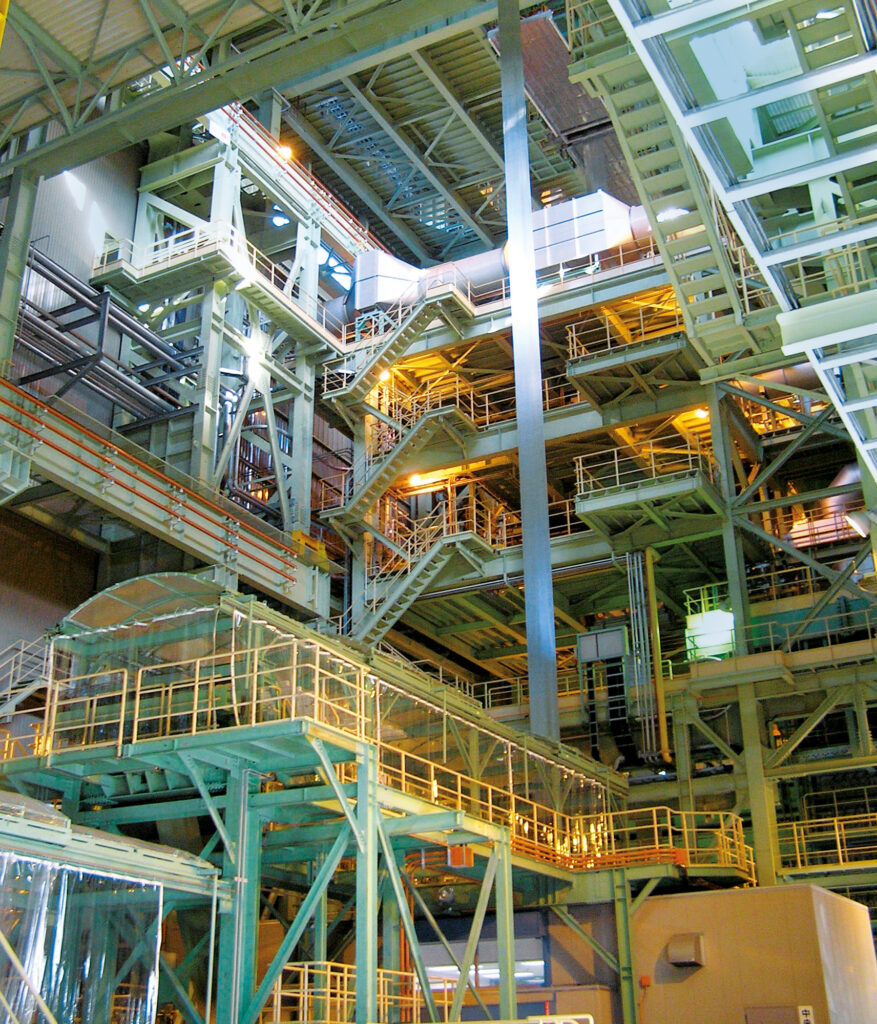
Rolling, annealing and pickling lines for stainless steel
Stainless steel lines from Primetals Technologies combine the traditionally separate processes of rolling, cleaning, annealing, pickling, skin passing and leveling into an integrated processing line. Following hot rolling, the stainless steel hot-rolled strip is annealed and pickled before it is cold rolled on either a 20-high reversing mill, or on a 6-high or 18-high continuous tandem cold mill. The cold-rolled strip is then processed back into the annealing and pickling sections and skin-passed. For the thinnest gauges, a rerolling operation is necessary. Table 3 shows the possible downstream line combinations offered by Primetals Technologies, and Table 4 shows the latest combined processing line references for stainless steel.
Furthermore, the lines can be supplied with all of the necessary equipment required for continuous processing such as laser welders, horizontal loopers, side trimmers with an integrated scrap chopper, rotary shears and the SIAS automatic surface-inspection systems.
Cold-rolling section:
The 18-roll stand concept, recently redeveloped by Primetals Technologies and marketed as the Power X-HI Mill, includes a number of unique features. As a result of the high work-hardening characteristics of stainless steel, small work rolls are required to achieve the necessary reduction. The technology uses additional lateral support rolls to ensure stable and controllable rolling. Lateral shifting of the intermediate rolls as well as positive and negative bending of the intermediate rolls enable a precise strip shape control to be achieved. The mill is equipped with an automatic roll-change car for work rolls and intermediate rolls, thus enabling roll replacement while the process section is being operated.
Cleaning section:
Strip surface quality is an essential property of stainless flat products. Strip cleanliness prior to the annealing furnace or after the mill is therefore paramount in importance. Reliable inline degreasing sections provide the required strip cleanliness for assuring highest product quality.
Annealing and pickling section:
The work-hardened strip requires annealing and surface-scale removal. This is carried out in a tunnel furnace and acid pickling section. For hot-rolled strip, Primetals Technologies also supplies shot-blast and scale-breaker equipment that is installed between the furnace and pickle sections to remove scale. Figure 5 shows a combined stainless steal annealing and pickling line supplied by Primetals Technologies.
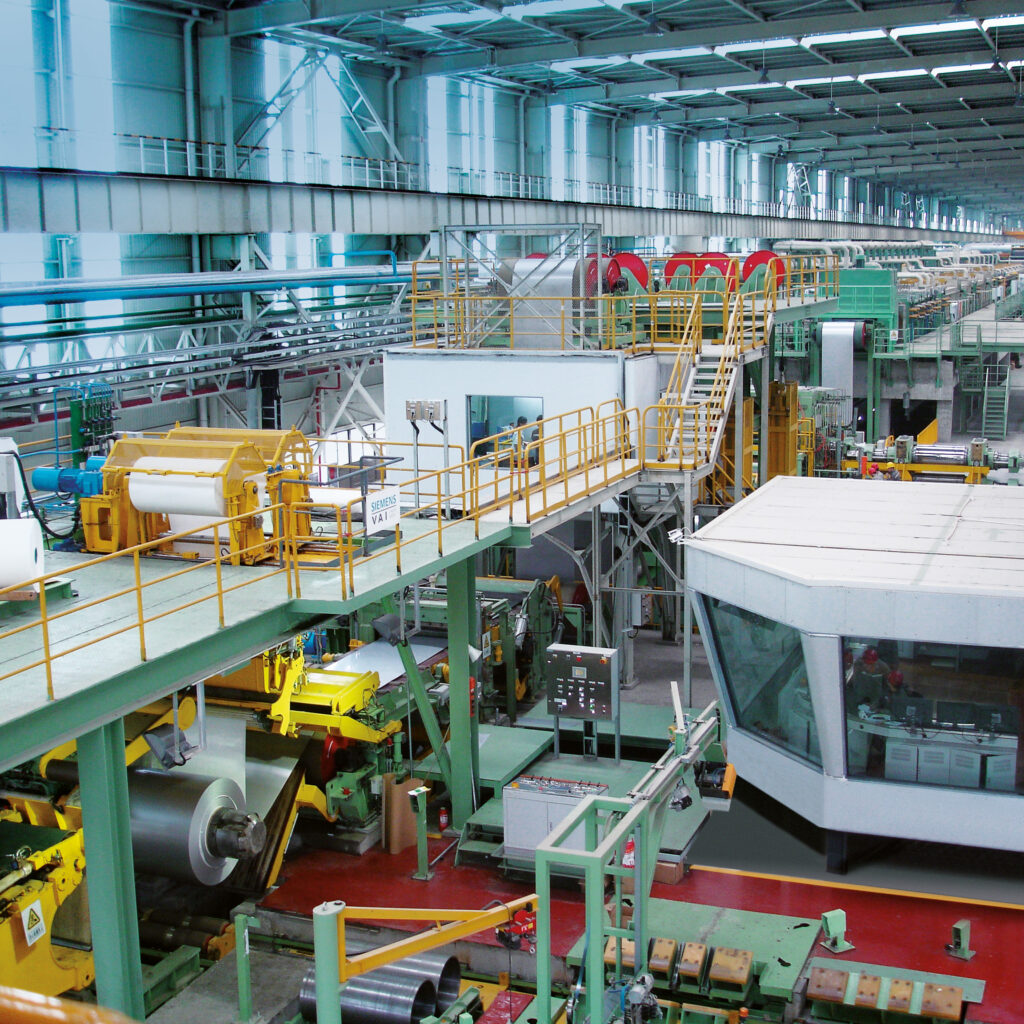
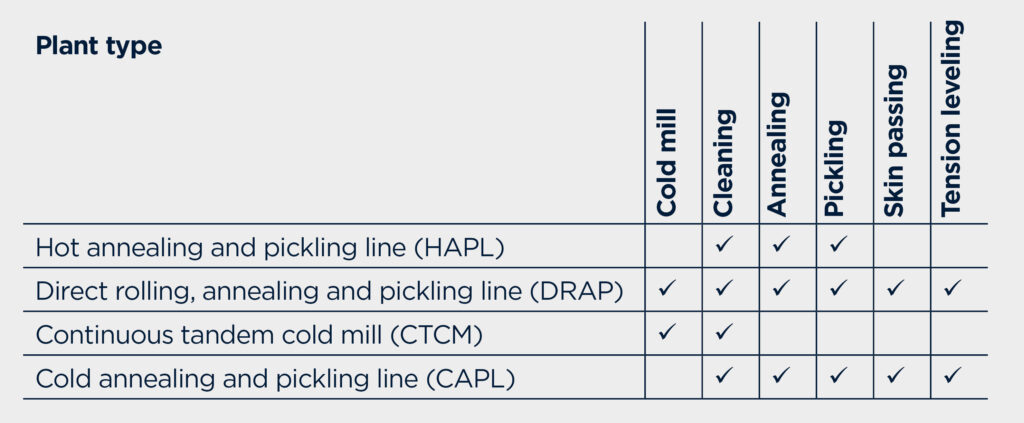

Process experts systems, metallurgical expertise and know-how
As a market leader in the field of strip-processing lines, Primetals Technologies is not only a plant builder and equipment manufacturer, but also widely recognized as a key partner for plant quality monitoring and production development. The company’s solutions incorporate various expert systems for continuous tracking of both the equipment operating conditions and product quality.
Process quality control
The steel industry has made tremendous progress in improving product quality through process control. Processing lines are equipped with an increasing number of sensors and gauges that generate an abundance of data to be analyzed by plant personnel. To assist with daily plant operation and process know-how management, Primetals Technologies developed advanced software such as TCOptimizer and TPQC (Through Process Quality Control).
These tools collect data and signals from all parts of the line and upstream processes, as well as from the external laboratory when required. Through multi-source data correlation models and business management rules, all associated gigabytes of data are transformed into comprehensive production events and just-in-time alarms. This allows immediate and focused corrections by the line manager or operators. The systems also incorporate a sustainable knowledge-management function that effectively documents best practices and solutions for solving problems. All data can be easily exported for further use in material development or for direct assistance from metallurgical experts at Primetals Technologies. Table 5 shows TCOptimizer references installed by Primetals Technologies.
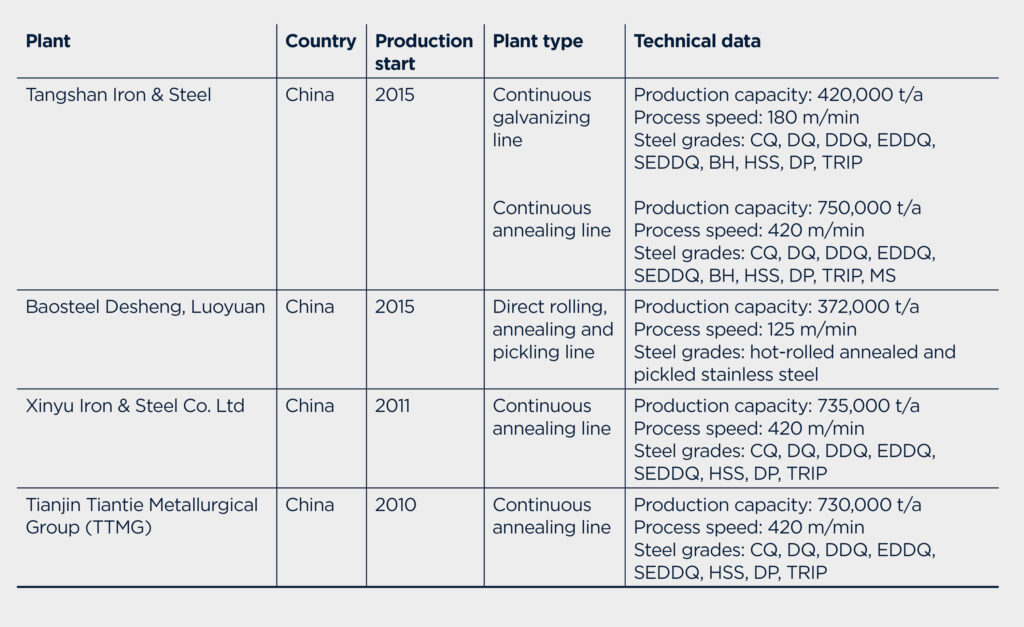
SIAS automatic surface-inspection systems
Producers of flat-rolled products are increasingly being required to conform to the trend toward zero-defect tolerances regarding surface quality. With single-camera inspection and a powerful third-generation LED illumination system, the SIAS on-line surface-quality control system detects and automatically classifies all surface defects visible on the strip for all flat-product rolling and processing plants.
Surface inspection on processing lines detects both upstream (incoming material) defects and those that are a result of the process itself. It performs final product quality control and allows the optimization of process parameters and production practices to reduce defect occurrence. With over 130 references, SIAS is the world’s leading solution for surface-quality control.
Condition monitoring
Condition monitoring is the process of constantly checking the health of a set of machines. The condition monitoring system (CMS) from Primetals Technologies significantly improves the monitoring, optimization and management of equipment and plants. Since 2012, company-supplied laser welders and side trimmers have been equipped with a CMS for optimal plant operation, accurate maintenance scheduling and the prevention of downtimes. A CMS can also be integrated in the framework of a retrofit.
Inline measurement of THE mechanical properties of strip
Inline determination of the mechanical properties of strip in galvanizing lines and continuous annealing lines is now possible with the PropertyMon system. On the basis of contactless and non-destructive measurements of electromagnetic parameters, it is possible to calculate the magnetic properties, tensile strength and yield strength of steel along the entire strip length.
Metallurgical support
The manufacture of advanced steel grades, such as advanced high-strength steel (AHSS), generally requires a modification of the production steps along the entire value chain. As an example, recent processing lines built by Primetals Technologies are designed to process grades up to DP1200. Besides the necessity to define specific plant parameters and machine sizing, this new generation of materials involves other matters that need to be addressed, for example, precisely monitored upstream processes, furnace control with pre-oxidation stages, and a rapid cooling system. All of these factors have a major impact on end-product quality.
Solutions and services are offered to assist customers in the development of advanced or new steel grades. This includes metallurgical know-how support; a mobile surface inspection system for specific test campaigns; physical simulators for rolling, leveling, annealing and galvanizing process development; and metallurgical simulation tools and models. In-house company experts provide these services.
Plant modernization
Primetals Technologies has a wealth of experience in upgrading and modernizing processing lines. The targets may include:
- Decrease of operational costs (energy, maintenance, consumables, personnel)
- Improvement product quality (thickness, flatness, surface) or production capacity
- Extension of the product mix in terms of steel grades and dimensional ranges
- Enhancement of operations and maintenance with a focus on user-friendliness and safety.
The improvement of pickling lines serves as an example of the upgrading capability of Primetals Technologies. Almost all pickling lines experience a deterioration of the pickling tanks when high-tensile-strength steels are produced. Silicon (Si) sludge typically clogs nozzles, piping and heat exchangers in silicon steel production, and working conditions often need to be improved. iBox pickling technology from Primetals Technologies addresses these issues. Developed in 1990, it has helped to improve pickling productivity, suppress Si-sludge clogging, and reduce energy, acid and steam requirements. The solution has also simplified maintenance work. More information about iBox pickling technology is outlined in a separate article in this issue.
With a systematic approach, Primetals Technologies works closely with its customers to develop a tailored modernization concept based on individual needs. All prevailing conditions are taken into account. Furthermore, the company’s upgrading experience assures fast production ramp-up to the targeted product quality with minimum plant downtime. Figure 7 shows the upgraded pickling line at Tata Steel IJmuiden and Table 6 lists recent pickling line modernization projects of Primetals Technologies.
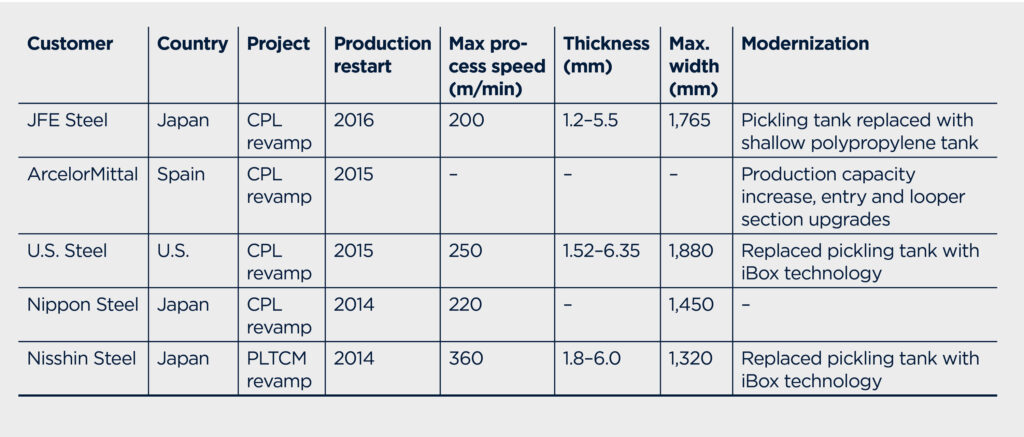
Commitment to quality
Strip-processing lines play a decisive role in meeting the strictest quality specifications as required by high-end steel applications. Existing processing solutions, however, will not be sufficient to satisfy tomorrow’s demands placed on product properties, certification, costs and plant reliability. Primetals Technologies, together with customers and partners, therefore continues to focus on developing the solutions of tomorrow to support producers to meet their future production and marketing targets.
